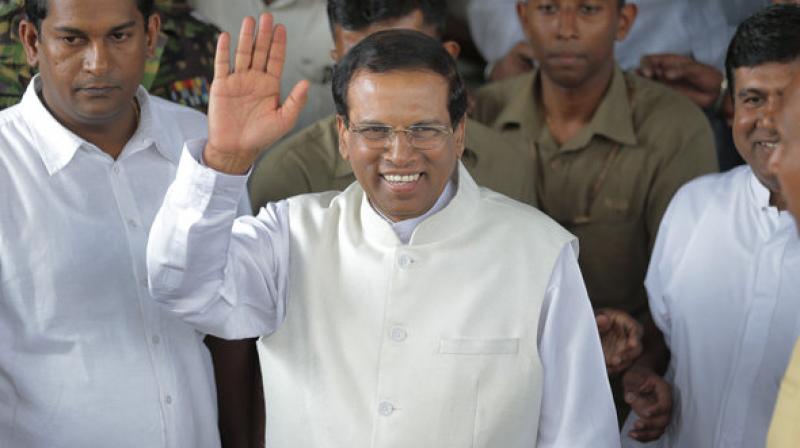India interfering in Lanka's internal affairs: Chinese scholar

Beijing: Riled by Sri Lankan envoy's assertion that Colombo will not permit China's military presence in its ports, Chinese official media on Tuesday quoted a scholar who accused India of "interfering" in the island nation's internal affairs.
Sri Lankan envoy to China Karunasena Kodituwakku last week said that Colombo will not permit any military activity by China in any of its ports, including Hambantota in which Chinese firm will have 80 per cent stake.
"Sri Lanka's promise is unnecessary because the port is meant for civilian use, and shows that India is interfering in Sri Lanka's affairs," Chu said.
"China has no intention to offend India, and the program is good for Sri Lanka's economic development. But if India has a problem with the program and oppresses its neighbour, it only shows that it is interfering in other countries' domestic affairs," Chu Yin, an associate professor at the University of International Relations, told state-run Global Times daily.
Lin Minwang, a professor at the Institute of International Studies of Fudan University said "Sri Lanka initially wanted India to help develop Hambantota port, but it finally turned to China for help since India faces financial difficulties and concerns over future competition with its own ports in the Indian Ocean."
Separately an article in the same daily said "China won't back down from building economic, commercial ties with Sri Lanka" maintaining that Beijing will not be left behind India in "boosting its presence".
"It would not necessarily be a bad thing if healthy competition between China and India in the Sri Lankan market could be further stirred up," the article said.
"While China and Sri Lanka ramp up efforts to finalise a free trade agreement (FTA) this year, India is pushing for the signing of the Economic Technology Cooperation Agreement with Sri Lanka to broaden the scope of its existing FTA. It seems that neither China nor India wants to be left behind in boosting its presence in the island nation," it said.
Last September an article by Forbes magazine has said foreign loans and investments in Sri Lanka including that of from China are driving the country to bankrupt.
The official estimate of what Sri Lanka currently owes its financiers is USD 64.9 billion of which UDD eight billion owned by China. Sri Lanka's debt-to-GDP currently stands around 75 per cent and 95.4 per cent of all government revenue is currently going towards debt repayment.
"Sri Lanka may be in a debt trap that it can't get out of. This year (2016) alone USD 4.5 billion is due to foreign lenders and next year (2017) USD four billion is owed bills which the country has not yet figured out a way to pay," it said.
"Much of Sri Lanka's pile of debt accrued in the process of initiating an entire buffet of large-scale and extremely expensive infrastructure projects under the direction of former president Mahinda Rajapaksa," it said.
"Between 2009 and 2014 Sri Lanka's total government debt tripled and external debt doubled, as the country engaged in a number of costly undertakings," it said.
Significantly the article in the daily said investments will play an important part in the Free Trade Agreement (FTA) being worked out between China and Sri Lanka as Chinese manufacturers plans to sell goods made in Sri Lanka in India.
The FTA was expected to be finalised when Sri Lankan Prime Minister, Ranil Wickramasinghe visits Beijing to take part in the Silk Road summit being held by China in May this year.
A "tripartite arrangement on trade and investment is likely to be discussed among India, Sri Lanka and Singapore," the article said.
"Sri Lanka may even be able to serve as a gateway to help Chinese investors explore the Indian market as the island nation is keen to make itself an offshore centre for South Asia," it said.
Indian officials say this meant that China wants to set up manufacturing in Sri Lanka to sell the goods in India, which New Delhi is unlikely to encourage. While India may be open for goods made in Sri Lanka with local and Indian investments, goods made with third country investments may come under different category, they said.
Besides giving 80 percent stakes to a state run Chinese firm in Hambantota port for 99 years, debt ridden Sri Lankan government also plans to hand over 15,000 acres to a Chinese industrial park for manufacturing.
Both moves spared violent public protests in Hambantota with locals refusing to part with their lands.
While the Chinese media highlights its growing investments in Sri Lanka which totalled to over USD eight billion in the last few years, Colombo says the some of the projects are not unviable.
In his interaction with media here Feb 4, Kodituwakku said that the Hambantota port hasn?t been a viable project so far.
"Very small numbers (of ships). Even the incoming they have received is not even enough to maintain the port maintenance, forget the salaries about the people who are working," he said.
The Hambantota airport which was built with millions of dollars Chinese investments during the previous pro-China President Mahinda Rajapaksa has been converted into warehouse as it has no demand.
The article in Global Times said despite China's assurances that its investments in Sri Lanka are commercial, "India may still worry about the tentacles China stretches into the Indian Ocean".
"Despite a repeated pledge that Chinese investment in the Sri Lankan Hambantota port is normal business, India has remained alert. Further, Sri Lanka offered reassurances over the weekend that Chinese military activity would not be allowed at the port. Such words can be seen as diplomatic rhetoric to comfort India as Beijing and Colombo already have an understanding that the project is purely commercial," it said.

